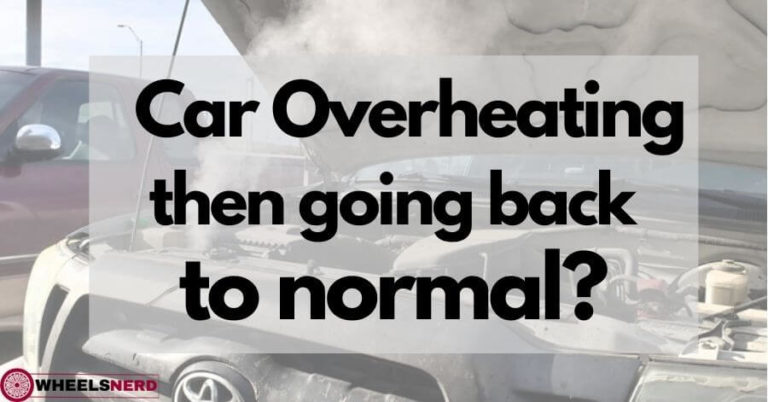Car overheating and then returning to normal is becoming a typical problem among many cars, and it can be inconvenient to deal with if you don’t know what’s causing it.
In brief, the most typical reason for an automobile overheating and then cooling down is a defective thermostat, which cannot regulate the flow of hot water through the radiator to cool down the engine.
We will examine why your automobile is overheating and then cooling down and what you can do to remedy it. So, keep reading.
Causes of Overheating then Going Back to Normal

There are various reasons your automobile may be overheating, but the most common cause is a problem with the cooling system that prevents heat from leaving the engine area.
A leak obstructs the cooling system or other engine components. Rubber hoses, gaskets, and water pumps are all susceptible to leaking due to normal wear and tear. Below, we will explain some common reasons for the excess heating of your car.
Poor Thermostat
When the car is overheating, it’s likely due to a faulty thermostat. You’ll have this difficulty when the engine thermostat ceases to go up and down to control the temperature.
Defective Radiator
If the temperature reading in your car continues to fluctuate owing to the amount of heat inside, it may indicate that your vehicle’s radiator is failing. You may have a radiator problem if the temperature gauge goes up and down constantly, especially if your car is starting to overheat.
This problem happens if the radiator fan turns off or works improperly. If this occurs, the car will lose coolant more quickly than expected.
Failure of Sensors
If your vehicle is overheating, one of the sensors in your automobile is likely malfunctioning. This problem arises when a sensor fails to input your engine control module. Your coolant system does not detect the heat. In this case, the car may also send false alerts and faults.
Coolant Depletion
If your car is overheating, it could be due to a lack of coolant. The temperature reading will go up when this happens, and the engine will start overheating.
This problem occurs when your vehicle’s cooling system has an underlying issue, such as coolant leaks and problems evacuating heat from the engine. It also happens when your oil cooler leaks or your head gasket fails.
Malfunctioning Water Pump
If the car is overheating when you’re driving, it could be an indication of a leaking water pump. This problem occurs when the water pump has expired and needs a replacement.
Faulty Coolant Switch
A faulty coolant switch can be the cause of the car’s heating. The defective coolant switch fails to work, and your engine heat goes unchecked.
Low Engine Oil
If your car is overheating, your engine oil may be running low. It can arise if your car’s engine doesn’t give enough lubricant or grease to the mechanical components.
Also Read: Car won’t start after overheating (Here is why)
What to Do When Your Car Overheats?

If your car’s engine overheats, keep the following items in your vehicle.
- A basic tool kit in a small package
- A couple of quarts of oil
- Coolant (antifreeze fluid and water.)
- A Cloth
- Gloves with a lot of grips
Below are some things to do when you find your engine overheating.
Run a Vehicle Analysis to Determine the Root Cause
If your car is displaying overheating problems and then cooling down for no apparent reason, you must inspect it to find out what’s wrong.
When it comes to potential concerns with your vehicle’s coolant system, including such leakage and coolant loss, they don’t always occur when the car is not running. When a problem emerges, you should consider having your vehicle inspected by a qualified mechanic or technician.
Replace the Failed Thermostat
The overheating problem is most likely due to a faulty or broken thermostat. Because this component controls the flow of hot water into your radiator, it should be the first thing you examine. Replacing a malfunctioning thermostat usually fixes the issue.
Look for Coolant Problems
Since this is a prevalent problem with vehicles, it’s critical to look for leaks in your cooling system. You can do this by looking for visible leaks in the coolant reservoir, checking underneath the car for leaks, getting an accurate temperature reading from the temperature gauge, seeing if the temperature is rising excessively, and seeing if their coolant is running out quickly.
Once you’ve discovered a possible leak in the system, have it checked out by a certified mechanic to figure out what’s causing your car to overheat.
Radiator Replacement
If you observe that your vehicle is overheating and cooling down afterward, the trouble can be a malfunctioning radiator. Because it encourages coolant flow throughout the whole engine system, this component is crucial for keeping the engine cool. When this happens, your vehicle may overheat, resulting in catastrophic consequences.
Pause for a Moment
Suppose your car continues overheating after driving with the heater for a few minutes. In this case, pull aside and switch everything off. Then, you can wait for your car to cool down before driving again. It is the safest and most effective way to cool the engine.
Conclusion
An overheating car is a major issue resulting in engine failure or possibly engine replacement. If your car overheats and then cools down, it’s critical to seek a competent mechanic or technician to assess the problem before it’s too severe and expensive.


Thank you for this information very helpful